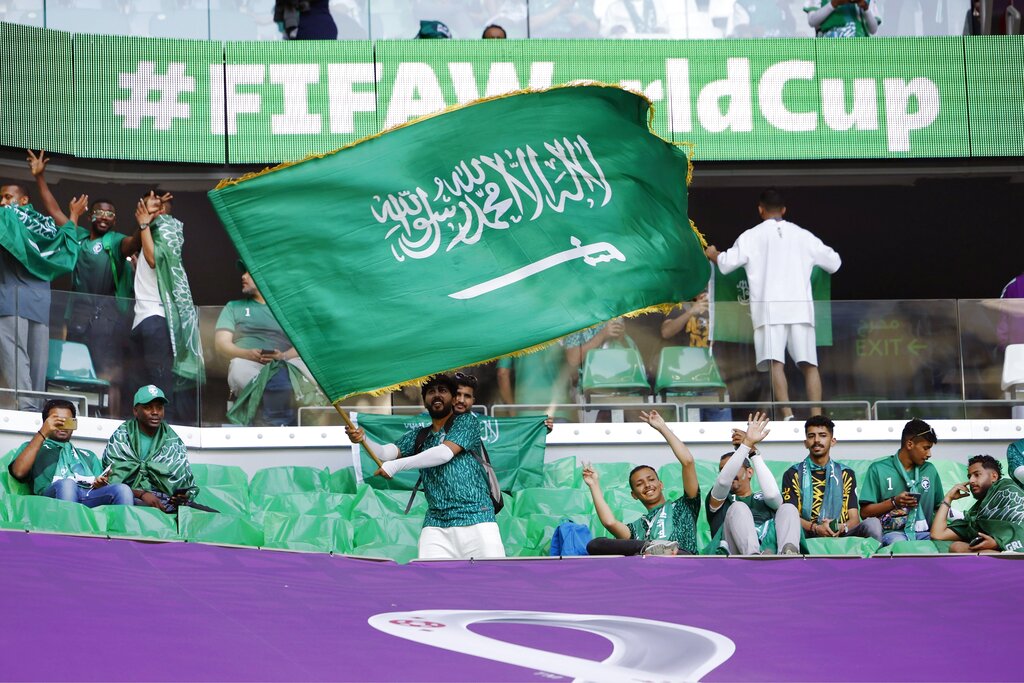
Last November in Doha, I shared a table in a smokey hotel bar with three Saudi soccer fans basking in their nation’s stunning 2-1 victory over eventual Qatar World Cup winners Argentina. Bedecked in green and white, they toasted that most improbable of triumphs, while relishing in the global game’s biggest stars congregating for the first time in the Middle East. “Just you wait,” one said to me. “Saudi Arabia in 2030 will be even better than this.”
I laughed. It sounded like the kind of post-battle hubris that infects fans regardless of time and place. But no, my new friend insisted, a plan was already in play for a joint bid with Egypt and Greece that would involve Riyadh paying for all the associated infrastructure in the partner countries. It sounded ludicrously ambitious—a World Cup stretched across three continents (albeit at the intersection of each).
In the end, the folly came right on time though massively amplified and, it turns out, merely as fluff before the money shot. Uruguay, Argentina, Paraguay, Spain, Portugal and Morocco will host the 2030 tournament spread across the Atlantic, clearing the way for Saudi Arabia to be lone World Cup host in 2034. The latter was confirmed on Tuesday after potential rival Australia decided against fighting the inevitable. “It is what it is,” shrugged Football Australia Chief Executive James Johnson.
The 2034 tournament, insisted Saudi Football Federation Secretary-General Ibrahim Alkassim, would be “a force for good in football.” That remains to be seen, though what it does show is that the World Cup—the most-viewed sporting event across the globe—was powerless to repel the same centrifugal forces that had already ensnared golf, Formula One, boxing, cricket, WWE, and even the 2029 Asian Winter Games (a $500 billion mountain resort is being purposefully built.) Under Crown Prince Mohammed bin Salman, Saudi Arabia has plowed upwards of $1 trillion on sports and sports-related projects, according to Simon Chadwick, a professor of sport and geopolitical economy at the Skema Business School in Paris. The Kingdom is hosting chess and handball and horse racing and the world’s first electric raceboat championship, dubbed E1.
“It is a clear-cut, unadulterated example of sports washing,” says Jules Boykoff, a professor specializing in the intersection of politics and sport at Pacific University, Oregon. “It’s stoking nationalism at home, deflecting attention from human rights problems and trying to garner national prestige.” Not that bin Salman has any qualms with the term, telling Fox News in September: “If sport washing is going to increase my GDP by way of 1%, then I will continue doing sport washing.”
The capitulation of even soccer—the world’s most lucrative sport, with a net worth of some $600 billion—seemed sadly inevitable. Not that world governing body FIFA put up much of a fight. After FIFA opened the floor for potential 2034 bidders in early October, Saudi Arabia declared its intent with great fanfare within minutes. Previous World Cup bids required at least seven existing stadia. For 2034, this requirement was reduced to four. Saudi Arabia had just that number. FIFA then suddenly announced that rivals had just 25 days to declare formal interest, including securing central and local government backing for a 48-nation, multi-billion dollar event across several cities. (Typically, bids would be decided three years hence.)
The aura of inevitability stretches back farther. The “Visit Saudi” tourism campaign sponsored the Qatar World Cup and Saudi Football Federation President Yasser Al Misehal was elected to the FIFA Council in February. Its domestic Saudi Pro League has splashed out almost one billion dollars in the summer’s transfer window, according to Deloitte, with marquee players such as Brazil’s Neymar joining Portugal’s Cristiano Ronaldo to ply their trade before bemused crowds in half-full stadia.
Bin Salman claims this sporting investment boosts Saudi’s tourism sector. Yet the economics argument doesn’t hold water given the colossal sums involved. In truth, ideology underpins the endeavor. Bin Salman is intent on rebranding his Kingdom at the apex of an Afro-Eurasian conception of the world, while injecting some Western dazzle that might lure the Kingdom’s educated, technocratic diaspora back home. “Saudi Arabia is trying to position itself at the intersection of the Global North and the Global South,” says Chadwick.
And so, all the same criticisms that dogged the Qatar World Cup regarding labor rights, the provision of alcohol, and the lack of inclusiveness for the LGBTQ+ community will be resurrected and turbocharged. Saudi Arabia is, after all, a country that orchestrated the brutal murder of prominent journalist Jamal Khashoggi and last year sentenced one woman to 34 years in prison for tweets. Nor should we forget its predilection for mass executions or its recent slaughter of hundreds of migrants at the Saudi-Yemen border.
Not that a focus on these issues is necessarily problematic for the bin Salman project. Aside from Western criticism, the Qatar World Cup allowed Doha to project itself to the Global South as an affluent, bold, and futuristic face of the Arab world. And even if Saudi Arabia struggles to replicate that success, 11 years of negative Western headlines will likely only gird locals and bind them ever more tightly to the leadership. Adds Boykoff: “An us-versus-them mentality has long been a great way to rally and mobilize people for what you want them to do.”
More Must-Reads From TIME
- The 100 Most Influential People of 2024
- Coco Gauff Is Playing for Herself Now
- Scenes From Pro-Palestinian Encampments Across U.S. Universities
- 6 Compliments That Land Every Time
- If You're Dating Right Now , You're Brave: Column
- The AI That Could Heal a Divided Internet
- Fallout Is a Brilliant Model for the Future of Video Game Adaptations
- Want Weekly Recs on What to Watch, Read, and More? Sign Up for Worth Your Time
Write to Charlie Campbell at charlie.campbell@time.com